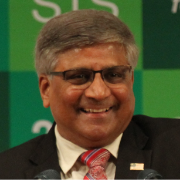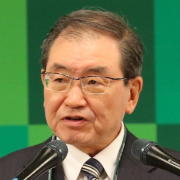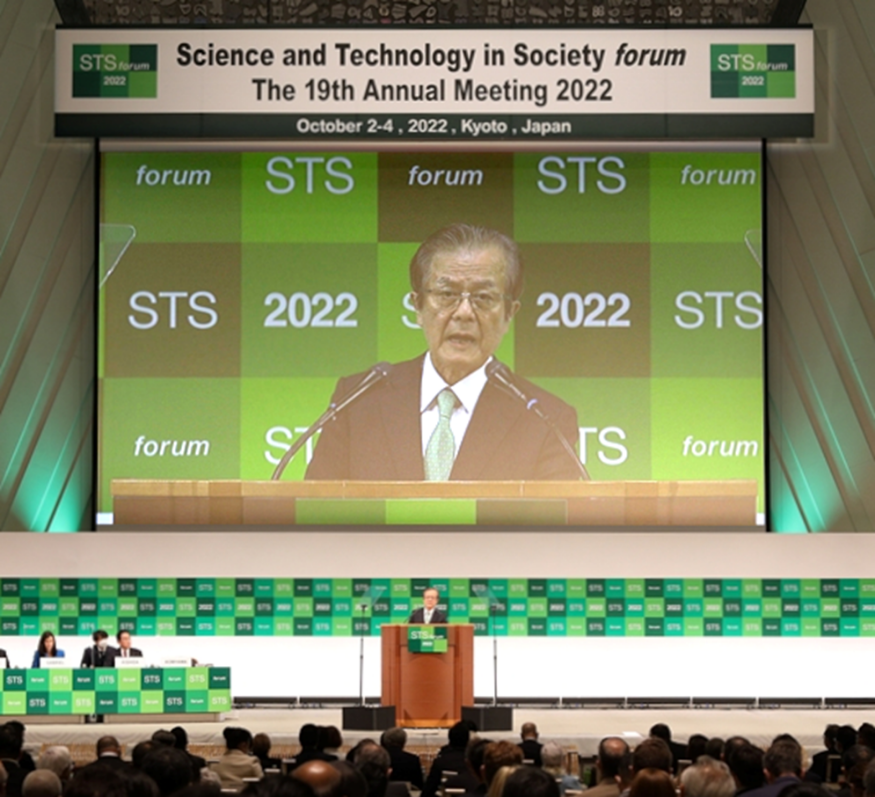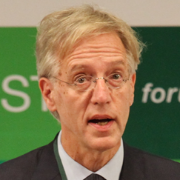
Due to the global COVID-19 pandemic, the annual meeting of the Science and Technology in Society forum (STS forum) was forced to be held online for the previous two years. This year, however, it was held in person for the first time in three years. Nearly 1,000 leaders from over 80 countries, regions, and international organizations attended the meeting, engaging in vigorous discussions and renewing old ties.
STS forum was founded in 2004 by Koji Omi, a former Minister of Finance and former Minister of State for Science and Technology Policy in the Japanese government, who passed away in April. STS forum holds an annual meeting in Kyoto every October, bringing together global opinion leaders consisting of not only scientists, but also policymakers, business leaders, university presidents, research institute directors, presidents of science and technology investment foundations, and the media to discuss the benefits of advances in science and technology, and also the concerning issues they newly raise.
Furthermore, under the leadership of Hiroshi Komiyama, who was appointed as Chairman in 2021, STS forum will also focus on new concepts, including the need to synthesize an enormous amount of wide-ranging knowledge with a clear vision for the benefit of humankind, as well as the need to break down all kinds of silos that obstruct the continued development of science and technology. In addition, to commemorate the legacy of Koji Omi, from this year onward, the annual meeting will feature a special discourse and conversation with an eminent speaker, as well as a special session on the theme of the lights and shadows of science and technology.
At this year’s meeting, there were 11 panel sessions on topics that included path to sustainability; the human body and mind; inter-disciplinary research; groundbreaking technologies; basic science, innovation and policy; and the lights and shadows of AI. There were also 24 concurrent sessions held across 8 themes, namely energy, climate change, Earth and commons, life sciences, innovative engineering, cooperation in S&T, S&T education, and digital society. The following are some of the highlights.
The opening session was held on the theme of “World in 2022 – What do we need from S&T?” and chaired by Prof. Hiroshi Komiyama, Chairman, STS forum. Joining the Chairman were Mr. Fumio Kishida, Prime Minister of Japan; Ms. Mariya Gabriel, Commissioner for Innovation, Research, Culture, Education and Youth, European Commission; Dr. Bonginkosi Emmanuel “Blade” Nzimande, Minister, Department of Higher Education, Science and Innovation, South Africa; Dr. Sethuraman Panchanathan, Director, National Science Foundation (NSF), U.S.A.; and Mr. Masakazu Tokura, Chairman of Keidanren and Chairman of the Board, Sumitomo Chemical Co., Ltd.
-

[Chair] Prof. Hiroshi Komiyama, Chairman, Science and Technology in Society forum (STS forum), Chairman, Mitsubishi Research Institute, Inc., Japan
-

Mr. Fumio Kishida, Prime Minister, Government of Japan
-

Ms. Mariya Gabriel, Commissioner for Innovation, Research, Culture, Education and Youth, European Commission
-

Dr. Bonginkosi Emmanuel "Blade" Nzimande, Minister, Department of Higher Education, Science and Innovation, South Africa
-

Dr. Sethuraman Panchanathan, Director, National Science Foundation (NSF), U.S.A.
-

Mr. Masakazu Tokura, Chairman, KEIDANREN; Chairman of the Board, Sumitomo Chemical Co., Ltd., Japan
In their remarks, the speakers discussed how science and technology should anticipate social needs, develop knowledge and technologies that provide long-term societal benefits, and help find solutions to current and future challenges. Several major challenges were taken up, including the adverse impacts of human activity on the planet, such as climate change and environmental destruction, as well as deepening inequalities. The point was made that many of these challenges are caused or exacerbated by excessive capitalism, and several speakers spoke of the need for a new and more sustainable form of capitalism that also incorporates social perspectives. Moreover, science and technology have the power to produce innovations that could even turn social issues into engines of growth. Science and technology must, however, be supported by investment, synergies, people, and collaboration among people. Several speakers stressed the importance of collaboration in particular, which must be global, cut across different disciplines and parts of society, and be based on shared fundamental values and aspirations. During the session, the speakers also mourned the loss of Founding Chairman Omi and Honorary Chairman Shinzo Abe, former Prime Minister of Japan, noting their invaluable contributions to STS forum.

Prof. Hiroshi Komiyama, Chairman, Science and Technology in Society forum (STS forum)
The following session, 101 – Path to Sustainability, was chaired by Dr. Robbert Dijkgraaf, Minister, Ministry of Education, Culture and Science, Netherlands, and the speakers’ discussion broached the challenges that hinder the path to sustainability, namely climate change and its impacts, the destruction of biodiversity, and environmental pollution. The speakers suggested that the solutions to these challenges would require the inclusion of all stakeholders, including the younger generations, local government and smaller businesses, which would bring diversity to the solutions, as well as truly global cooperation with leadership that is undertaken at various levels, including local government and smaller businesses. The speakers also emphasized the importance of energy security on the path to sustainability and the need to uphold existing agreements on sustainability and climate change. They also discussed the creation of circular economies that recover valuable resources from supply chains including new hydrogen and ammonia energy supply chains. In addition, the speakers spoke about the importance of taking a pragmatic approach to energy infrastructure investment, leveraging existing infrastructure in a way that takes humanity to zero emissions by decarbonizing and lowering emissions in such high-emissions infrastructure.
-

[Chair] Dr. Robbert Dijkgraaf, Minister, Ministry of Education, Culture and Science, Netherlands


Above: from Left to Right, Mr. Ahmad O. Al-Khowaiter, Saudi Arabian Oil Company, Mr. Takeshi Uchiyamada, Toyota Motor Corporation, Mr. Yasutoshi Nishimura, Minister of Economy, Trade and Industry of Japan, Ms. Inger Andersen, the United Nations, and Dr. Robbert Dijkgraaf, Minister of Education, Culture and Science of the Netherlands [Chair].
Left: Prof. Dr. Mohan Munasinghe, Munasinghe Institute for Development (MIND), who participated online.
-

Mr. Yasutoshi Nishimura, Minister of Economy, Trade and Industry, Ministry of Economy, Trade and Industry; Member, House of Representatives, Japan
-

Ms. Inger Andersen, Under-Secretary-General of the United Nations and the Executive Director of the United Nations Environment Programme, United Nations

Prof. Harriet Wallberg, Professor and former President, Karolinska Institutet, Sweden [Chair] and Prof. Joseph E. Stiglitz, Professor, Economics, Columbia University, U.S.A. [Nobel Laureate 2001 (Economics)]
Session 102, the inaugural Koji Omi Memorial Lecture, began with a keynote lecture by Prof. Joseph Stiglitz, Nobel laureate in economics and Professor of Economics at Columbia University, on the potential of science and technology to create solutions, but also to harm humanity. For example, the COVID-19 pandemic saw the rapid development of mRNA vaccines, but also the hoarding of vaccines by developed countries. Similarly, modern telecommunications technology has enhanced the speed and reach of communication, but also led to unprecedented levels of misinformation and disinformation. Nevertheless, with political will, policies informed by the social sciences, adequate intellectual property frameworks, and leadership of the scientific community, it is possible to enhance the lights and manage the shadows of advances in scientific knowledge. Following his lecture, Prof. Stiglitz engaged in a wide-ranging conversation with the chair of the session, Prof. Harriet Wallberg, Professor and former President of Karolinska Institutet, and fielded questions from the audience. Prof. Stiglitz, Prof. Wallberg, and the audience dug deeper into ways to curb the harms of science and technology, before discussing the shortcomings of capitalism in its current form, and the need to transform it.

Prof. Joseph E. Stiglitz
-

Prof. Harriet Wallberg
The theme of Session 104A, chaired by Dr. Teruo Fujii, President, The University of Tokyo, was “Breaking Silos in Research: How can Inter-disciplinary Research be Effectively Conducted?” The speakers reaffirmed the importance of inter-disciplinary research, which is essential for tackling climate change and the other major challenges faced by humankind, all of which are inter-disciplinary problems requiring inter-disciplinary solutions. Moreover, inter-disciplinary perspectives are needed to create the kinds of value that modern societies need and want. The speakers also recognized that many forms of silo exist, not only within the natural sciences but also between the natural sciences and social sciences, as well as between academia and industry. They drew special attention to the importance of social science perspectives, noting that it is no use developing solutions if society will not accept them. As for how to break down silos and promote inter-disciplinarity, the speakers recommended promoting dialog and collaboration, recognizing and rewarding inter-disciplinarity and collaboration in research funding and academic awards, and fostering inter-disciplinary mindsets in the education and training of the younger generation.
-

[Chair] Dr. Teruo Fujii, President, The University of Tokyo, Japan
-

Dr. Magdalena Skipper, Editor-in-Chief, Nature, U.K.
The second day began with Session 200 on “Analysis and Synthesis in Science – The Human Body and Mind,” which was chaired by Prof. Hanoch Gutfreund, Executive Committee Chairperson, Israel Science Foundation (ISF); Professor Emeritus; Former President, Physics, The Hebrew University of Jerusalem. The speakers considered the complexity of the human brain and mind, particularly consciousness, which is especially challenging to study and understand. They spoke about how technological progress, not only in biology but also data science and AI, has helped advance understanding on the brain and mind, which in turn feeds back into advancing AI research. In addition, the speakers discussed metagenomics and how microbial communities affect humans’ sense of wellbeing and behavior. The important role of the social sciences in research on the human body and mind was also emphasized. There is a tendency for natural scientists to only attempt to explain the effects and results of their work to the public at the termination of a project, but this should be done upfront. If the research can be understood and shared, it enhances the capacity of the research and support for it. The speakers concluded that synthesis and analysis, and the incorporation of social and behavioral sciences, are essential for studying the human body and mind, or any other complex scientific topic.
-

[Chair] Prof. Hanoch Gutfreund, Executive Committee Chairperson, Israel Science Foundation (ISF); Professor Emeritus; Former President, Physics, The Hebrew University of Jerusalem, Israel
-

Prof. Dr. Michael O. Hengartner, President, ETH-Board, Switzerland
With Prof. Alejandro Adem, President of the Natural Sciences and Engineering Research Council of Canada (NSERC), serving as its chair, the Koji Omi Memorial Session: Lights and Shadows of AI drew focus to the transformative influence of AI on the course of humanity, for better and for worse. In terms of the lights, speakers shared how AI is enabling major advances in areas of image and language processing, pattern recognition for medical applications, and expansions of creativity. Tools such as machine learning have allowed major cost reductions and previously unthinkable efficiency gains. However, the speakers also warned participants of the shadows of AI. The brittle nature of machine learning systems can result in unpredictable failures when confronted with novel inputs. Tackling biases, both explicit and implicit, was also stressed as an important task for those designing AI systems. The speakers also noted that issues of data security and privacy must be at the forefront of society’s attention, as the world becomes increasingly saturated with data. Collaborative efforts including policymakers, scientists, industry, and the general public will be necessary to safely and positively deploy AI into society and confront its shadows.
-

[Chair] Prof. Alejandro Adem, President, Natural Sciences and Engineering Research Council of Canada (NSERC), Canada
-

Dr. Hiroaki Kitano, Senior Executive Vice President and CTO, Sony Group Corporation; Professor, Open Systems Science Unit, Okinawa Institute of Science and Technology Graduate School, Japan
Session 300 was chaired by Prof. Eng Chye Tan, President of the National University of Singapore, and reported on the key messages from the concurrent sessions, which covered a vast range of topics. The Energy sessions identified actions necessary to reach net-zero emissions and the transitional path towards renewables, then delved into state-of-the-art energy solutions. The Climate Change sessions first discussed the various hazards associated with climate change and necessary adaptations, the financing measures necessary for reaching a sustainable economy, and negative carbon technologies to be used as potential solutions. The Earth and Commons sessions covered topics including the challenges of agriculture, food, and water security, ways to address loss of biodiversity, and the importance of protecting marine resources. The Life Sciences sessions explored the critical issues surrounding inequality when preparing for the next health crisis, tools to expedite development of vaccines and therapeutics, and ways to ensure public health and build public trust. The Innovative Engineering sessions covered themes ranging from materials and devices for revolutionizing technology, to the lights and shadows of quantum technologies, and autonomous robotics and AI. The Cooperation in S&T sessions focused on science and technology as a driver for development through exchanges and collaborations among academia, industry, and government, and the steps necessary to raise the next generation of scientists. The S&T Education sessions began by discussing the necessity of including the arts, humanities, and social sciences in promoting science and technology, then covered topics of making science and technology education more prevalent across society and creating new systems of learning. Finally, the Digital Society sessions covered the opportunities and risks of big data, the dangers of ransomware, and the increasing importance of information authenticity and governance.
-

[Chair] Prof. Eng Chye Tan, President, National University of Singapore (NUS), Singapore
-

Dr. Carlos Américo Pacheco, Executive Director, State of São Paulo Research Foundation (FAPESP), Brazil
-

Professor Marileen Dogterom, President, Royal Netherlands Academy of Arts and Sciences (KNAW); Head of the Department, Bionanoscience, Delft University of Technology, Netherlands
-

Mr. Terry Brady, President and CEO, UL Research Institutes, U.S.A.
The closing session, which was chaired by Prof. Pavel Kabat, Secretary-General, International Human Frontier Science Program Organization (HFSPO) and former Director General & CEO, International Institute for Applied Systems Analysis (IIASA), covered the topic of “Science and Technology for the Future of Humankind.” The speakers began by highlighting the issue of climate change. Much focus is placed on the shift to renewable sources of energy. However, another important approach to pursue in parallel is increasing the efficiency of current fossil fuel production and consumption. Oil and gas companies must accept responsibility for the damage they have caused to the environment, and become key partners on the path towards solving the energy transition, energy security, and energy poverty issues facing society.
The speakers next turned to the importance of increased research funding towards scientific progress. Such funding is critical to developing solutions to the crises in areas of environment, food, health, and inequality. Additionally, it is critical that we find new methods to motivate and inspire scientists around the world. Beyond merely scientists and researchers, there must be fundamental changes to the behavior of all individuals – new mindsets and new ethical standards. Military conflicts also must come to an end. The destructive impacts of climate change are already being seen across the world and will only escalate without further action.

[Chair] Prof. Pavel Kabat, Secretary-General, International Human Frontier Science Program Organization (HFSPO); former Director General & CEO, International Institute for Applied Systems Analysis (IIASA)
Following this, speakers placed particular emphasis on the importance of intellectual curiosity to affect change in science. Advances in science stemming from explorations of fundamental research have been critical in reaching present levels of rapid progress. This was illustrated clearly by the developments that enabled swift creation and deployment of COVID-19 vaccinations. Given the scale of current problems in society, cooperation bridging areas of basic science, medical science, and practical applications are more important than ever. Furthermore, work bridging borders of countries – and boundaries of disciplines – must continue in order to adapt to the changes in science and technology.

Closing Plenary Session 301: Science and Technology for the Future of Humankind
On the screen from the left top to right bottom, Prof. Dr.-Ing. Matthias Kleiner, Technical University of Dortmund, Prof. Dr. Ada E. Yonath, Weizmann Institute of Science, Dr. Ismail Serageldin, The Library of Alexandria, Mr. Roberto Furian Ardenghy, Brazilian Petroleum and Gas Institute (IBP), and Prof. Pavel Kabat, International Human Frontier Science Program Organization (HFSPO)
The 20th Annual Meeting of STS forum is scheduled to be held in Kyoto from Sunday, October 1 to Tuesday, October 3, 2023.
